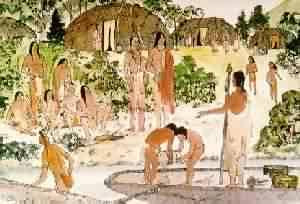
 The indigenous inhabitants of New Jersey was the Lenni Lenape meaning "original people". These inhabitants, part of the Algonquin nation, came to be called the Delaware Indians by the early settlers. They were known for their easy-going nature. Some of the other tribes scorned them for their peaceful intentions which often they played the mediator between disagreeing Algonquin tribes. The Lenni Lenape people were separated into three clans; the Minsi in the north, the Unami in the center, and the Unilachtigo in the south. The three clans are also known as the Wolf, Turkey, and Turtle clans. Clans lived in stationary villages and used the surrounding land until the resources were exhausted. The Lenni-Lenape built villages of round houses called wigwams. The tribes were nomadic and traveled with the seasons in order to make better use of the available natural resources, but they had permanent settlements where they returned in the winter. During the spring, they planted gardens of corn, beans, and squash. In the summer they migrated to the coast to collect oysters and clams. In the fall the Lenni Lenape would migrate back to their settlements to harvest their gardens and prepare for winter. They hunted for deer, elk, and turkeys using bows and arrows. Lenape men were typically in charge of hunting and protecting their families.
The indigenous inhabitants of New Jersey was the Lenni Lenape meaning "original people". These inhabitants, part of the Algonquin nation, came to be called the Delaware Indians by the early settlers. They were known for their easy-going nature. Some of the other tribes scorned them for their peaceful intentions which often they played the mediator between disagreeing Algonquin tribes. The Lenni Lenape people were separated into three clans; the Minsi in the north, the Unami in the center, and the Unilachtigo in the south. The three clans are also known as the Wolf, Turkey, and Turtle clans. Clans lived in stationary villages and used the surrounding land until the resources were exhausted. The Lenni-Lenape built villages of round houses called wigwams. The tribes were nomadic and traveled with the seasons in order to make better use of the available natural resources, but they had permanent settlements where they returned in the winter. During the spring, they planted gardens of corn, beans, and squash. In the summer they migrated to the coast to collect oysters and clams. In the fall the Lenni Lenape would migrate back to their settlements to harvest their gardens and prepare for winter. They hunted for deer, elk, and turkeys using bows and arrows. Lenape men were typically in charge of hunting and protecting their families. Women were the principle farmers and were in charge of cooking, and taking care of the children. Women grew their hair long, often until it reaches their hips. Men wore a plume of feathers in their hair, which stuck straight up or downward. Men decorated their faces elaborately; creating designs or animals. Men wore "breechcloats" or loinclothes. Women wore knee-length skirts. The Lenni Lenape were matrilineal in which "children do not inherit tribal rights from the father but from the mother. Described by the Europeans, Lenni government was male; with the civil and war chiefs. The chiefs ruled by "calm reasoning and friendly exhortations." They believed in a gender-neutral idea of god. The Indians
Women were the principle farmers and were in charge of cooking, and taking care of the children. Women grew their hair long, often until it reaches their hips. Men wore a plume of feathers in their hair, which stuck straight up or downward. Men decorated their faces elaborately; creating designs or animals. Men wore "breechcloats" or loinclothes. Women wore knee-length skirts. The Lenni Lenape were matrilineal in which "children do not inherit tribal rights from the father but from the mother. Described by the Europeans, Lenni government was male; with the civil and war chiefs. The chiefs ruled by "calm reasoning and friendly exhortations." They believed in a gender-neutral idea of god. The Indians  looked to an all-powerful Mannitto, "the Great Spirit."In 1682, the Lenni Lenape signed a treaty of friendship with William Penn and the Quakers in Pennsylvania. The treaty became the first of its kind signed between Europeans and Indians. The rapid rate of colonization forced the Lenni Lenape from their lands.The Lenni Lenape who chose to stay faced the horrors of alcoholism and the devastation from European disease. The European need to own the land, diseases, guns and alcohol created an impossible situation for the survival of the Lenni-Lenape in their homeland.
looked to an all-powerful Mannitto, "the Great Spirit."In 1682, the Lenni Lenape signed a treaty of friendship with William Penn and the Quakers in Pennsylvania. The treaty became the first of its kind signed between Europeans and Indians. The rapid rate of colonization forced the Lenni Lenape from their lands.The Lenni Lenape who chose to stay faced the horrors of alcoholism and the devastation from European disease. The European need to own the land, diseases, guns and alcohol created an impossible situation for the survival of the Lenni-Lenape in their homeland.Sources:
-Caffrey, M. (2000). Complementary Power: Men and Women of the Lenni Lenape. American Indian Quarterly. Vol. 24, No. 1. pp. 44-63. Published by: University of Nebraska Press
Stable URL: http://www.jstor.org/stable/1185990
Stable URL: http://www.jstor.org/stable/1185990
-Lazzerini, R. (2006). Native Americans of New Jersey: The Lenni-Lenape. Worldwide Genealogy Resources. http://www.kindredtrails.com/New-Jersey-History-4.html
No comments:
Post a Comment